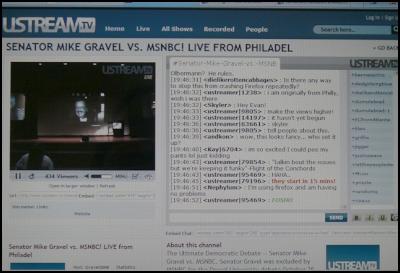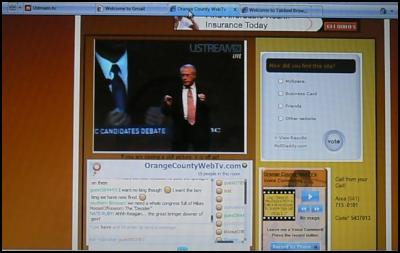Stateside: Speaking With Webbed Tongue
Speaking With Webbed Tongue
During the past fortnight, I have had a couple of chances to interact with the Internet in (for me) new ways. The first was during the Democratic presidential candidate debate in Pennsylvania, from which former Alaska Senator Mike Gravel was banned. No matter! He set himself up in a café across the street from the university where the televised debate was held and used a DVR (digital video recorder), a video projector, and an online streaming website to decode and debunk de debate for viewers.

Click for big version
A screenshot showing the stage setup in the café, with the MSNBC feed projected at the back on a screen, and the online chat community’s comments. No, the one quoting “Flight of the Conchords” wasn’t me!
Once the debate began, Gravel came out on stage and during the course of the debate often asked the techies to pause the DVR while he explained the political games that were being played by both the questioners and the candidates. The funniest moment came when the DVR was restarted from a paused Obama reply and somehow stuck in slo-mo, so that the Illinois Senator’s voice was deep and slow and scary. The techs quickly fixed that technical glitch but later when Barack was asked another question and answered at normal speed, the chatroom erupted in calls for Obama to “use your devil voice again!”
Predictably, the chatpanel on the ustream.tv website soon filled up with spammers and someone suggested going over to another website that was streaming the ustream.tv video, but where there were only a couple dozen viewers. (At the point I left ustream.tv, over a thousand viewers were online there, most of them not spammers.)

Click for big version
Screenshot of the Orange County (California) WebTV chatroom, where you could also leave voice comments.
A week or so later, I noticed there would be a webchat on the State Department’s USINFO website as part of the series it is doing about the US Presidential elections. These webchats are for people living in foreign countries to better become acquainted with the American way of life. They are also useful for foreigners resident in the US. For instance, the upcoming chat about Thanksgiving will be a chance for teachers of English as a second language to have their students participate in live online conversations in English.
I was able to ask a couple of questions of Paul DeGregorio, who, “from 2003-2007 was the United States’ chief election official”, according to the front page of the webchat. This former Chair of the Election Assistance Commission, which was established by the Help America Vote Act of 2002, is now the Chief Operating Officer of Everyone Counts, a company that promotes Internet voting.
http://www.everyonecounts.com/index.php/demos
Excerpted below are the two questions I asked and his answers.
Q [rosalea]: The typical US ballot is far more complex than ones in countries that have a parliamentary democracy, where typically you are voting to elect just one representative and there are no bond issues or constitution changes or referenda on the ballot. Also, those countries usually have a government department that is charged with running elections and has a budget for it. How does the US system, where counties and states are the level at which voting is paid for, cope with all the complexities within tight budgets and timelines?
A: U.S. election officials have traditionally had a difficult time securing enough fund and support to run their offices. When I was Director of Elections in St. Louis County, Missouri, USA in the late 80s and early 90s, I had to make a lot of noise to get more funds. It's quite different today due to the 2000 USA presidential election. Government officials pay more attention and Congress did allocate $3 billion dollars in federal dollars for election reform for the states, a first in the nations' history. However, compared to some countries I have seen, the USA still lags behind in its funding of election administration. By the way, Switzerland has a very complex parliamentary ballot. In the Bern canton (state), where I observed the process, voters could write in up to 26 names (some of them twice) on a ballot paper that had to be checked by hand twice and then each of the 26 votes (per person that is) entered into a computer software program as a data entry by hand. It took 2 days to count relatively few ballots.
…..
Q [rosalea]: Thank you for your answer to my earlier question, especially with the example you gave of the Swiss ballot counting. You say it took 2 days to count relatively few ballots, but I notice that each ballot was counted by hand twice and even though there was data entry, the ballot each person wrote upon would be the record used for a recount. Is it possible to count optical scan ballots in the same way and then use the computer reading of them for a recount only? I know there is a lot of concern that any sort of computer-tallied results occur out of sight inside a black box, and perhaps people would prefer to wait for a result they feel they can trust.
A: Counting paper ballots by hand is not as precise as you think it is. In my Swiss example, I noticed (by personal observation) people making mistakes in the count. Yes, most of these mistakes were probably caught in the second count, but perhaps not all. I have seen worn-out election workers, some who count paper ballots right after the polls close and some who count them the next day after a good nights sleep get frustrated by mistakes and inconsistent counts and decide to split the difference when their teams cannot reach agreement on the same stack of ballots. In the USA as you know, we are use to getting election results immediately. Any delays raise suspicions that votes are being changed and manipulated. Counting ballots by hand, especially in a presidential election, would take weeks if not months. And mistakes no doubt will be made in the count and magnified by the media. People will wonder why we didn't fix the system. Don't get me wrong, I am of the school that it's much more important to be accurate and complete, then issue incomplete or vote totals that may be in question. Unfortunately, election officials are pressured by the media to issue "unofficial" results, which can change the winner when absentee and additional votes are added to the totals days after the election (as is the case in California).
The full transcript can be clicked through to from http://usinfo.state.gov/usinfo/USINFO/Products/Webchats/degregorio_06_nov_2007.html
--PEACE--


 Ramzy Baroud: Fighting Israel’s War In Jenin - Can The Palestinian Authority Be Saved?
Ramzy Baroud: Fighting Israel’s War In Jenin - Can The Palestinian Authority Be Saved? Binoy Kampmark: Far From Ignorant - The European Union, Arms Exports And Israel
Binoy Kampmark: Far From Ignorant - The European Union, Arms Exports And Israel Binoy Kampmark: Jimmy Carter, Israel And The Apartheid Question
Binoy Kampmark: Jimmy Carter, Israel And The Apartheid Question Richard S. Ehrlich: Pulverized By Asia's Tsunami
Richard S. Ehrlich: Pulverized By Asia's Tsunami Binoy Kampmark: Greenland Redux - Trump And America’s Continuing Obsession
Binoy Kampmark: Greenland Redux - Trump And America’s Continuing Obsession Ramzy Baroud: A Palestinian Year In Review - Genocide, Resistance And Unanswered Questions
Ramzy Baroud: A Palestinian Year In Review - Genocide, Resistance And Unanswered Questions